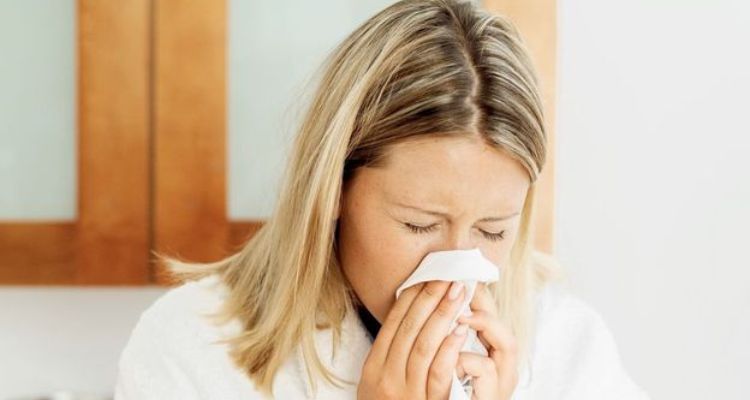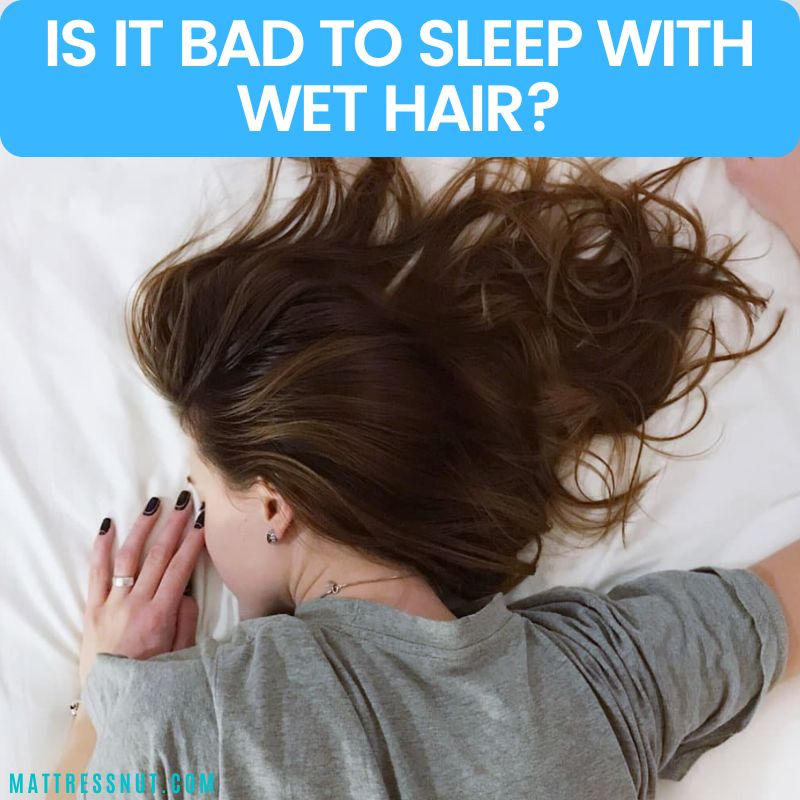Have you ever been told that you will catch a cold if you sleep with wet hair? Well, there might not be a chance of catching a cold, but it will make you sick differently.
In this guide, we will explore how sleeping with wet hair impacts our health and what you can do to make things right. So, continue reading and never land into health troubles.
Does Sleeping with Wet Hair Cause Cold?

Okay, so catching a cold might be the most common mythsical story you have heard from your parents. They are precisely wrong because you catch a cold when you are infected with a virus. There are 200 different types of viruses that cause colds, and the most common culprit here is the rhinovirus.
These viruses enter your body through the mouth, eyes, or nose and are spread via airborne droplets from an infected individual when coughing, sneezing, or speaking. Therefore, it has nothing to do with your wet hair and falling asleep.
Why is it Risky to Sleep with Damp Hair?
The risks associated with sleeping with wet hair might not be something to lose your sleepover. But you need to be aware of them before you make it a habit and wet your hair each night.
It can cause fungal infections
Catching a cold should be the last thing on your mind when sleeping with wet hair because there are other issues to deal with. You significantly increase any risks of developing some fungal infections on your scalp.
Fungi like Malassezia might lead to certain conditions such as dermatitis or dandruff. So, sleeping with dry hair is the best option. Natural fungus is present on your scalp, but your pillows also have this fungus. This fungus grows faster in warm and wet conditions. So, your wet pillowcase will be a suitable breeding ground for it.
A past study found about 4 to 16 different species on each pillow tested. The most common of these species is Aspergillus fumigatus, which can cause severe infections among people with weak immune systems. Moreover, it can cause asthma or worsen the symptoms.
It causes hair breakage
Sleeping with wet hair directly impacts your hair too. Apart from getting up with a super-kinked bedhead, you will damage your hair.
Your hair is fragile when wet, and while sleeping, you don’t know which sleep position you take. So, you might exert too much stress on your hair.
Some people also braid or some other tight updo before going to bed. Well, that is something you shouldn’t do when your hair is wet. So, if you have to go to bed with wet hair, you should leave them open.
You will feel colder
Sleeping with wet hair might not result in you catching a cold, but you will certainly feel cold. This is especially the case if you are sleeping in an air-conditioned room or during the peak of wintertime. Therefore, it is better to dry your hair before bed.
You will have to spend more time styling
We mentioned “super-kinked bedhead” earlier. Well, this will make you look funny in the morning and of course, you will have to spend more time styling your hair before you go to work.
As you sleep, they dry and set the same way. The worst offenders, in this case, are your crown hair and the ends. You might have to rewash them or apply plenty of gels or aerosols.
It can deteriorate your immune system
You won’t catch a cold virus when sleeping with wet hair, but it will make your immune system weak. And you become a more likely candidate to catch a cold virus. So, your parents weren’t entirely wrong when they said you would catch a cold if you went to bed with wet hair.
It causes dandruff
The prolonged dampness of your hair and the warmth from your head will boost bacterial growth, and we have already mentioned that it causes fungal growth. Your scalp will be stripped of any natural oils because your pillow will absorb them with that excessive moisture from your head.
Doing so will make your hair dull
When the pillow absorbs water from your hair, it also absorbs the natural oils on your scalp and hair. So, your hair will look more dehydrated and duller. This is because they are more prone to breakage. There is a huge difference between hair that feels dry to touch, dehydrated, and stripped of natural oils.
It can also cause hair loss

Your hair is pretty vulnerable when wet, and you have placed them on your pillow that absorbs the natural oils. Eventually, your hair becomes dehydrated, and its roots become weak. It can result in faster hair loss or even scalp ringworm. It is a type of fungal infection that is caused by damp and warm conditions inside your hair.
Doing so will also give you acne
Of course, your pillow has become the breeding ground for many bacteria. And this will result in a breakout on your face. Therefore, you should dry your hair before bed, or your skin will also face the repercussions.
It will fade your dyed hair color
You can sleep with damp hair occasionally, but doing it regularly will cause your dye to fade away much faster. It means you will have to undergo another treatment in a concise period, depending on how frequently you sleep with wet hair.
What Can You Do Instead?
To avoid any of these issues that we have listed above, you need to follow these steps:
- Ensure you wash your hair earlier in the evening and give them more time to dry. This way, you won’t dampen your pillow.
- You should use a silk pillowcase, so your hair won’t have to deal with frictions and will prevent breakage.
- You should dry your hair using a t-shirt because it will cause less damage than a towel or even long blow-dry sessions.
- Consider using a leave-in conditioner after you have washed your hair, as it will make your hair stronger.
- Don’t sleep with moist hair, especially if you have hair extensions, or they will become tangled.
- You can use a waterproof pillowcase on your pillow and change these pillowcases every other day.
What If You Have to Sleep with Wet Hair?
Maybe sleeping with wet hair isn’t something that you end up doing. It’s just your habit, and you love it. In such a scenario, you will have to take care of your hair and prevent any of the above-mentioned conditions from occurring in the long run.
You can apply coconut oil to your hair
Studies have shown that coconut oil protects against hair breakage caused by moisture. Your hair cuticle is made of flaps that are similar to roof shingles. And when wet, your hair soaks water and becomes more vulnerable to damage.
With coconut oil, you can reduce this damage as the oil prevents your hair from absorbing water. But you shouldn’t do this if you have seborrheic eczema because coconut oil can worsen your condition.
You should use a conditioner
Another option you can go for is to use a leave-in conditioner after you have washed your hair. Conditioners assist in closing your hair cuticle and reduce friction. And if you have chemically treated or bleached hair, using this conditioner will be even more beneficial.
Detangle and dry your hair as much as you can
If you get a chance to blow dry your hair before going to bed, then go for it. The less water you have in your hair, the better it is before bed. Simply avoid any excess stress on your hair.
Using silk or a waterproof pillowcase
A silk pillowcase will ensure that your hair is not exposed to friction and is better for your skin. But using a waterproof pillowcase will be even better because it won’t store any moisture in your hair and cause bacteria or fungi to develop and grow. You can also use a cap or a scarf.
You can put the hair up in a pigtail or a bun
A much easier way to keep your wet hair out of your face is to make a pigtail or a bun. Of course, you will have to sleep with your hair up, but you will reduce the damage by doing so.
Understanding the Impact of Sleeping with Wet Hair
Debunking Myths: Does Sleeping with Wet Hair Cause Cold?
Contrary to popular belief, sleeping with wet hair won’t cause you to catch a cold. Colds are caused by viruses, predominantly the rhinovirus. These viruses spread through airborne droplets and have nothing to do with your wet hair.
The Risks of Sleeping with Damp Hair
Although sleeping with wet hair doesn’t cause colds, it can lead to various other concerns. These include fungal infections on the scalp, hair breakage, feeling colder, the need for extra hair styling in the morning, a weakened immune system, dandruff, dull-looking hair, potential hair loss, acne outbreaks, and faster fading of dyed hair colors.
Proactive Measures: What Can You Do Instead?
If you’re concerned about sleeping with wet hair, consider washing your hair earlier in the evening, using a silk or waterproof pillowcase, drying your hair with a t-shirt, applying a leave-in conditioner, and avoiding sleeping with damp hair if you have extensions.
For the Die-Hard Wet Hair Sleepers: Precautions and Tips
If you insist on sleeping with wet hair, it’s vital to take some precautions to mitigate potential issues. Applying coconut oil can prevent hair breakage, using conditioners can protect your hair cuticle, and detangling and partially drying your hair can be beneficial. Moreover, opting for silk or waterproof pillowcases can reduce friction and moisture retention, and tying your hair in a bun or pigtail can minimize damage.
Conclusion
It is best to sleep with dry hair, but you can sleep with wet hair occasionally. Whenever you do that, make sure you wear your hair down and put them in a pigtail or a bun. Using a conditioner would be a good choice. Finger-comb your hair after getting up, and you will be ready to go wherever you want.
Sleep with wet hair FAQs
Does sleeping with wet hair cause a cold?
You might not catch a cold when sleeping with wet hair, but it will make you feel colder. You might have trouble sleeping and other health issues by doing so.
What’s the best way to sleep with moist hair?
Well, the best way is to wash less or blow dry before bed. You can use a leave-in conditioner and go for silk pillowcases. Don’t leave your hair undone; instead, put them in a pigtail or a bun to protect them from entanglement.
What can I do to sleep with damp hair, so they look good in the morning?
Make sure to put the hair in a loose bun or a pigtail. You can use a leave-in conditioner. In the morning, you finger-comb your hair, which will look nice.
Should I sleep with my hair up or down?
The best practice is to leave your hair down when you are sleeping as it reduces entanglement. And make sure that you don't rub your hair much against the pillow, or the hairs will lose their shape.

